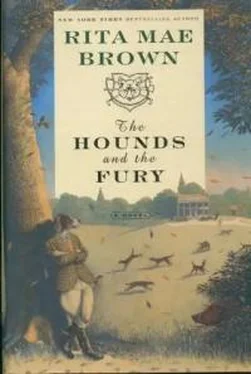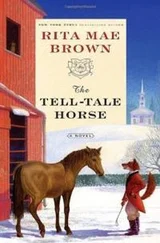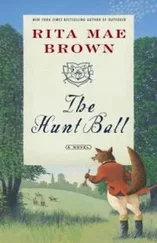Since Diddy was a second-year entry, Diana trotted over to double-check.
“Good!” The beautiful anchor hound seconded Diddy’s excellent work.
With that, the pack put their noses down, inhaled deeply, and opened in joyous chorus.
They threaded through the woods, the low limbs of spruces, bearing the snow’s weight, touching the ground. As hounds moved through they’d brush under the spruces; snow would cascade down in a shower of tiny sparkles.
Sister stayed on the farm road. No point plunging into the woods as long as she could keep near hounds. They were moving west. The folds in the land grew tighter. As she burst out of the woods the sun touched the top of the Blue Ridge Mountains, turning the snow crimson.
Scattered clouds began to glow underneath.
She turned to look behind. Tedi, Edward, Walter, Val, Tootie, Felicity, and Bunny Taliaferro constituted the field. The cold weather and last layer of snow had kept others at home. Then, too, the holiday season had ended, so folks redoubled their efforts at work. There were all those Christmas bills to pay.
The hounds suddenly shut up. Sister stopped on the meadow’s rise, the mild wind stinging in the cold, to behold them casting themselves.
Asa, wise, walked into the wind. Thirty yards later he picked up the scent, faint though it was, for the wind had blown it off the actual fox’s line and the scent dissipated as it lifted.
“Hop on it. Fading fast,” he commanded.
Not one hound would ever question Asa. They collapsed on the line and opened again, pushing ever westward.
Ahead, Sister saw Betty with Outlaw, her favorite mount, a tough little quarter horse, battling snowdrifts like a destroyer in heavy seas. To her left, Sybil was jumping a stout stone fence, some center stones having tumbled down over the years. Sybil kept alongside the hounds but far enough away not to bring their heads up or cause them to question her presence. The whole pack turned as one and cut sharply left, heading southwest now, to disappear into second growth forest.
Sister squeezed Keepsake, her thoroughbred/quarter horse cross, the perfect mount for this terrain and these conditions. He found his spot, soared over the stone fence, and then stretched out as they flew along the deer path in the forest only to burst out onto another meadow, broomsage spiking up through the snow.
They galloped down to a swift-running creek, where hounds threw up, meaning they lost the line, throwing up their heads. Unfortunately, so did Felicity. As hounds cast for the line she dismounted, ran behind a bush, and tossed her breakfast.
She came back, bright as a penny, and hopped up on Parson.
Tootie reached over to feel her forehead. “No fever,” she whispered.
“I ate too many doughnuts on the way over,” Felicity whispered back.
“Me too.” Val put her gloved hand on her stomach, the white string glove contrasting sharply with the black melton coat.
“You going to heave?” Tootie whispered.
“No.” Val shook her head as Bunny turned to glare at them for whispering during a check.
Cora moved further away from the pack, but she could find nothing.
Dasher stared down the steep bank of the creek, then launched himself. Airborne for a moment, he hit the water with a splash, swam with the current, and reached the far bank fifty yards downstream. He clambered out, put his nose to ground and worked back. He passed the pack on the other side and kept working. After five minutes, he had found nothing.
“Come on, Dasher. Good work, boy.” Shaker called the hound back.
The big fellow hurtled off the opposite bank and swam again, the current carrying him downstream. He emerged, shook himself, and trotted back to the others, working in vain.
“Helicopter.” Dasher laughed.
“Yeah.” Trident agreed that the fox must have stepped into a helicopter to be lifted right up.
Nothing remained. Not the tiniest scrap of scent.
“I hate this!” Cora, filled with drive, kept searching.
“Come along.” Shaker called them together. “Good work. I’m proud of you. We’ll hunt back.”
As they turned to hunt on the south side of the fixture, moving in an arc toward the trailers two miles distant, Sister heard a siren.
As the crow flies, they were little more than three miles southwest of Chapel Cross. By road it would take fifteen minutes, but the sound carried.
Sister wondered if one of the DuCharmes had finally met his Maker.
No, but one of the DuCharmes was deeply troubled.
Ben Sidell stepped out of his squad car. Margaret, in shearling coat, came out of the small dependency in which she lived.
“I’m so glad to see you. You made good time.”
“I was going against morning traffic.” He noted the rich seal-brown color of her hair falling over the shoulders of her coat.
“Look at this.” She walked to her Subaru Forester and opened the door.
Ben touched nothing but carefully noted Iffy’s wheelchair on its side, blood spattered over the backrest.
CHAPTER 20
Although his partner accused him of clutter, Uncle Yancy hotly denied this. Target collected possessions just sitting under a rosebush. Uncle Yancy believed his treasures had been carefully selected, not just picked up in collector’s mania.
True, he built little caches into which he stored the odd mouse part, chicken wing, or rabbit. He used to push corn, even fat millet heads, into his cache piles. Lately, though, he kept the grains in his den. For one thing, he couldn’t always find his caches under snow. He could hear mice two feet under snow. They’d burrow through if snows hadn’t packed down hard. There was plenty of oxygen for them. He’d hear those tiny claws, and he could pounce. But caches made no noise, so he’d learned to keep a grain bank account.
Since he had taken over the pattypan forge, storage space was ample. He’d lined his main sleeping quarters with grasses. He’d bedded down his storage chambers, although not as deep. Some foxes didn’t mind sleeping with frost in their dens. He did. That’s why he insulated his sleeping quarters.
The quiet pleased him. The only thing that didn’t please him was returning to find a glob of blood near his den. Human footprints clearly stood out in the snow. The blood carried an odd odor, so he didn’t touch it.
He’d returned from desultory hunting that morning. The two-mile trot down to the main house at After All had invigorated him. He’d intended to hunt, but Tedi had left out corn oil–soaked kibble behind her stable. He’d stuffed himself.
Sister would refill the special feed buckets Thursday night. One was tied to a tree perhaps a quarter of a mile from pattypan.
At eleven, his restorative sleep was interrupted by Aunt Netty.
“Wake up, you lazy ass.” She pushed him with her dainty paw. “Filthy, as always. Frozen blood by the den entrance. You are disgusting.”
He opened one eye. “My precious.”
“Don’t precious me. I’d heard you took over pattypan. Knew you wouldn’t stay over there at the old Lorillard place. Boring over there. Besides” —she paused, half closing her eyes to savor her imagined triumph— “too far from me.”
Uncle Yancy, no fool, smiled. “ You’re right.”
“It’s beautiful here. I always wanted to live at pattypan, but the minks—well…” She shook her head disapprovingly.
Minks, little weasels, possessed ferocity in inverse proportion to their size. They had run out the foxes who’d lived at pattypan years ago and then had bred more minks. Squabbles increased with the population. The younger minks left, heading west. Many now lived on Hangman’s Ridge, but they usually kept out of view. Others pushed on to Mill Ruins, where vigorous mouth battles with other animals, especially squirrels, were daily dramas. The older minks at pattypan flourished until they challenged Athena. Like most arguments, silly though it was, it illustrated the incompatibility of both parties. Furious, Athena systematically killed them until there wasn’t one old mink left.
Читать дальше












